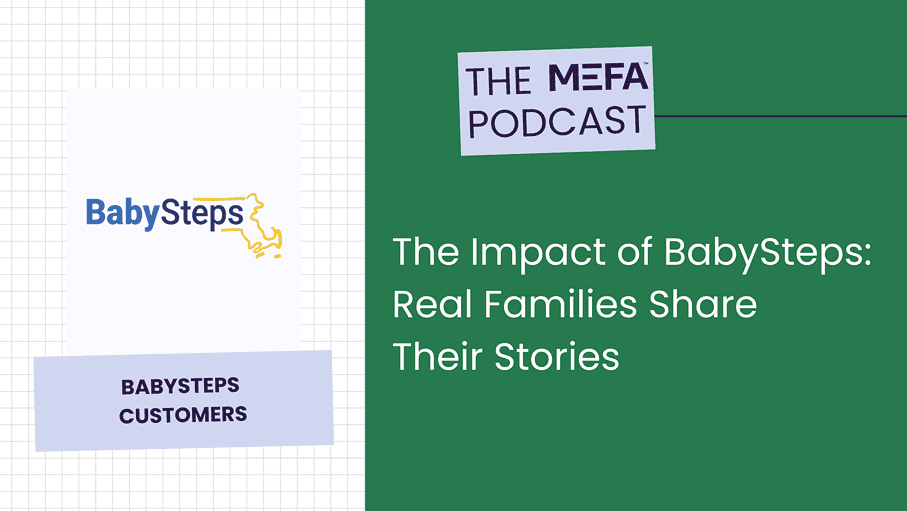Resources Mentioned in this Episode
Jonathan Hughes: [00:00:00] Hey folks. Welcome to the MEFA Podcast. My name is Jonathan Hughes and this is another special episode of the show. We are creeping up on the 29th of May, and that is 5 29 day. 5 29 day is the day where we celebrate 5 29 programs. The tax advantaged savings vehicles used for education initially designed for college.
It’s expanded to include K through 12 tuition, apprenticeships, repaying student loans and more. And in fact, this is even a special 5 29 day because it is the fifth anniversary of Baby Steps. And MEFA is proud to partner with the Massachusetts State Treasurer’s Office of Economic Empowerment to offer baby steps, which seeds $50 an UFund account for every baby born or adopted in Massachusetts.[00:01:00]
Who has then one year to open a youth fund account and claim their $50 seed? So to honor this occasion, we reached out to Baby Steps Families and are featuring five parents on the show to talk about their experience with baby steps and what advice they have to give. And I love talking to all of them.
You’re going to love hearing what they have to say. I cannot thank them enough for their time and their energy. In fact, I have the feeling I’ll be doing it again in about 20 minutes. But let’s cross that bridge when we come to it. Right now. Let’s meet our baby steps parents.
Ankit Consul: Yeah, so hi. My name is Ankit Consul and I have two kids. The elder one is two and a half years old, the younger one. My daughter, she’s nine months old. I live in the Greater Boston area.
Drew Scott: Yeah, so I’m Drew I live in Roslindale. I have one son he’s four and a half.
Alex Diskin: My name is Alex Diskin. I live in Canton, Massachusetts. I have two kids, a [00:02:00] daughter who just turned five, and a son who will be two in July.
Tim Oakes: So my name is Tim Oakes. I live in Foxborough, down on the South Shore. And I am a dad of three kids. I have a 7-year-old, a 2-year-old, and a 1-year-old.
Mike Fallon: Name’s Mike Fallon. I’m from East Bridgewater. My wife and I have one son. He is four years old.
Jonathan Hughes: All right, so if I can ask you though, when you first heard about baby steps?
Ankit Consul: So I first heard about baby steps in the hospital after when my first child was born. We got some paperwork really when I first heard about it.
Tim Oakes: I think when we were in the hospital. I am thinking we were filling out paperwork was the first, my first introduction to it. And, I think I, like everyone got on my phone and Googled what it was, and at first thought maybe it was too good to be true. Who’s giving away free money these days?
Drew Scott: My son was born in Newton Wellesley. There was an individual on the staff there amidst all of the other activity that was going on after the birth of my son who provided some of the information, at [00:03:00] least within some sort of, packet from the hospital-
Alex Diskin: And they’re handing you just paper after paper about information that you need to know. Everything from feeding schedules to doctor’s appointments, they included a piece of paper about baby steps. So we just assumed it was like the next thing we were supposed to do.
Mike Fallon: And part of that paperwork I remember was something around setting up a 5 29 for your kid and you get a free 50 bucks if you signed up. That was the first time I had ever heard the baby Steps program.
Jonathan Hughes: Was saving for college something that you had in mind to do before learning about baby steps.
Tim Oakes: So it was right. I didn’t really, I don’t think I had a game plan for it, but it was, hey, going to be a dad. One of the, one of the big life expenses would be to, save for college for my kids. But it definitely wasn’t something I had an actual concrete plan for.
Alex Diskin: We had been talking about how we were going to save for her college before we got to the hospital. So when we saw like that paper, it was like a sense of relief. because we were like, oh, they’ve figured it out for us. We just do this. Okay, this is the path we’re going to go down. [00:04:00] One less decision we have to make.
Drew Scott: Did I intend to do it? Certainly I intended to do it one way or the other. I think that the biggest benefit from my standpoint of getting the information at that point in time was it definitely accelerated when I would do it.
Alex Diskin: I think truly. It would have fallen to the very, very bottom of our list of things to do if we hadn’t had that prompt to actually just go get it started.
Tim Oakes: So that’s why, that was really why I really liked the Baby Steps program because it. It gave you a kickstart and a path to, two savings that I was able to take advantage of.
Ankit Consul: I knew I had to save for, kids’ education. But yeah, getting presented that paperwork right after the child was born refreshed it and, also stressed how important it was. It was always on my mind, but it kind, there are some of, there are a lot of things that are on your mind, but you don’t know where to start. You might get confused between, there are so many choices out [00:05:00] there, but being presented with that specific paperwork. Tailored to your state location and coming from hospital, which is, which, in paper form, which seems much more authentic and trustworthy.
Mike Fallon: We definitely were planning on saving for his future college education, whatever that looks like. When my wife and I had gotten married. We put everything together financially. And she had some student loans, obviously from when she was in college. We both got extra jobs and paid down her student loans, so we didn’t have any debt left, which was definitely a painful experience.
We both went back, got part-time jobs in addition to our full-time jobs, and I just remember us talking about I do not want my, we did not want our kid. Having to go through that or being burdened with student loans if we could help it. We for sure leading up to getting pregnant and having our child had decided that whatever it was we were going to do, we were going to do something to make sure that hopefully he didn’t have to experience any of that stuff.
And then in the process of all that, like I said, when we put everything together, I started to really dig into [00:06:00] finances and stuff like that. Doing some research, learned about five 20 nines, and it just seemed like a no brainer to do it. And then it was just an added bonus when I, like I said, when I got that paperwork in the hospital talking about the three $50 and the baby steps program.
Jonathan Hughes: You check the box in the hospital that says, yes, I’m interested, and yes, remind me. But then of course you have to go and set up the account, go online and do that. Did you find that difficult or easy to do?
Ankit Consul: I think it was really easy. If I remember correctly I think I just had to go to the Fidelity webpage and, it was pretty seamless, you could open an account, you could nickname the accounts, and it was pretty fast and, and the paperwork arrived on time after I had opened it. So it was pretty intuitive and, user friendly.
Drew Scott: No, I found it. I found that to be pretty straightforward. I think I was fortunate in the fact that I did have some level of an existing relationship with Fidelity, for other accounts [00:07:00] and other products, I think that they manage my wife’s like 401k program and things of that nature, right?
So I was a little, I was familiar with the platform so transparently that could have given me a little bit of a leg up from that standpoint. But I do think that it’s. It’s at least worth noting that it’s on par with anything else that you would do with them. Which I think that they try to make it a pretty straightforward experience, right?
Whether it’s opening a 5 29 or an IRA or a Roth IRA or whatever the case may be. The good news is in this day and age, you’re talking about a few clicks and maybe connecting to your existing bank account. And that’s really about as complicated as it gets, right? I think the good news is in our mobile first or web first model, with most of these financial platforms they really try to make it as simple as possible.
Alex Diskin: That part was super easy. I think I got it started and [00:08:00] then realized I needed the social security number, which babies don’t get, obviously, when they’re right in the hospital. But I set a little reminder to myself that once I got the social security card to just go back in and finish it, it also happened that we had our other retirement accounts already set up.
Logging into the portal was easy and being able to just establish another account was pretty easy.
Tim Oakes: Yeah. Yeah. Extremely easy. They made it very easy. Everything was, the communication was clear and simple to do. It was, I can’t think it took me longer than five minutes to do. It was via the Fidelity website.
It was really, a couple clicks of a button. I already had a Fidelity account, so maybe it was super easy for me. But it was, I remember being like 10 clicks total. So pretty easy.
Mike Fallon: Yeah, it was super easy. My wife and I, when we had gotten married, tried to get our financial stuff in order. So I’m super organized and a nerd when it comes to that kind of stuff. So we had some investing that we were doing through a, a brokerage or whatever and I just ended up setting it up online. I think it took 10, 15 minutes if that. It was super easy.
Jonathan Hughes: Do you [00:09:00] have a strategy going forward, but not that you have the account set up?
Mike Fallon: Yep. We absolutely do. My wife and I are we, we do a budget every single month and part of that budget is we figure out what we’re going to put aside for savings and investing and all that kind of stuff. And obviously our son’s a part of that. So we have a set amount that we contribute into his 5 29 on a monthly basis. Yeah, so I do personally prefer to do automated deposits on a monthly basis.
Tim Oakes: I do biweekly contributions from my paycheck, which is great.
Mike Fallon: And we, what we’ve tried to do anyways is over the years is as both of us get our reviews and get raises, we try and bump that up a little bit. We also, like if we get extra bonuses or like this month for us as an extra paycheck month, we, both my wife and I are.
Paid bi-weekly so this is one of those extra months where we have an extra paycheck, so we have a little bit extra going in there.
Ankit Consul: I just have I have set up automatic deductions from my checking account that goes directly into the kids F 5 29 [00:10:00] accounts. And I think this, the strategy behind multiple accounts is just to track them better.
To have that clear designation by, I have identified the beneficiary in both those accounts. And yeah, the strategy is just automatic and it really isn’t dependent upon, let’s say you need X amount of money. So I’m not depositing with that target in mind. I am depositing.
The maximum that I can, given the current circumstances, because my strategy is not to, I’m not there with the mindset of giving a hundred percent, or, targeting an X percent, covering an x percent of the tuition and all those costs. It’s just that to, it’s just to do the best I can and with the belief that, something is better than nothing.
Money can flow really fast out of the checking account, so it’s better to have them, it’s better to have automated deductions.
Alex Diskin: We’re setting aside a [00:11:00] small amount out of each paycheck. So we already knew how to turn on the automatic contributions, and now we could just say we wanted it to go to both accounts.
We’d already figured out things like. How to create a little link that family and friends at birthdays and whatnot could contribute to.
Drew Scott: In addition to that. I know for a fact because I’ve done it in a number of different instances. I know that Fidelity will also help you create essentially like a gifting link, right?
So there are instances where I’ve sent it out to friends and family, especially as my son has accumulated more things and we get to the point where we’d say, Hey, you know what would be nice is more of an investment in his future.
Tim Oakes: My kids have plenty of toys, right? My, their grandparents know that. So sometimes they say, I don’t need you, I don’t need to spend the 30 bucks at Target to get more junk for your house. How can I, is there an account or a donation? I can make for, for them and I’ve given them the baby steps account on several occasions.
Mike Fallon: My father [00:12:00] this kind of cool thing he did as my son got his baby teeth every single time he got one of his new teeth in my father contributed a hundred bucks to his 5 29. So I think that in some cases, especially with close family, we’ve at least provided that link out to folks to offer that up as an option because that investment in his future as opposed to yet another toy definitely seems like a worthwhile investment and a worthwhile option. And then, my son does like little chores and stuff like that around the house. He has a little piggy bank and I think once a year we empty it out and bring it over to the bank and then transfer the money over to his 5 29.
Jonathan Hughes: Almost the last question I have is about the actual $50 seed deposit. How did it feel to know that you had the account and it was already, it had a little bit of money in there to get started?
Alex Diskin: I think. I remember my husband and I looking at each other when we saw that, when we were reading about the program and saw that the state would get us started with $50 and we both looked at each other does every state do this? They should. [00:13:00] Why don’t they?
Ankit Consul: And so that was a nice, I think, pretty sweet gesture, like for the state to put some seed money in. And it also incentivizes you to quickly open the, quickly take action. But yeah, I think it was a really nice gesture-
Alex Diskin: Just even having a small. Seed to get you started. Like it’s what you do when you’re helping a younger person, a teenager, maybe even younger, get started with their own first checking account. You give them their $25 to put into the account so that it teaches them like this is yours. You get to watch it grow and you feel ownership over it.
Ankit Consul: I thought. It might take time to come, but I think it, it gets credited really fast. I think in a month or something. It gets credited.
Tim Oakes: College is expensive. When I went, so in 18 years from now or a couple years ago, I’m sure the costs are only rising. So to be able to at least start a fund at least have this base that [00:14:00] can grow and, using compound interest and investing strategies that can grow and become hopefully a. A nice chunk of money to be able to gift my kids when the time is right.
Mike Fallon: It definitely motivated me again, me being the nerd that I was, I think I, I. Literally think I like broke out my phone in the hospital and did the calculator. I’m like, what would the $50 turn into by the time he was in college?
The big role that was played by kind of the baby steps program in particular and the staff at Newton Wellesley in addition to that, was accelerating my process. When you think about the time value of money and investing those dollars earlier on in, in your child’s life. Every year that you, every year that you start earlier, right?
If you start from birth or really from that point forward, it can make such a big difference in terms of how those dollars are able to build up over time.
Ankit Consul: I think it’s always better to be prepared some amount of preparation [00:15:00] versus no preparation. You have 18 years. To work towards it.
Tim Oakes: Just in a, on a personal investing strategy, right? Compound interest is the eighth wonder of the world. You’re at such an advantage as a baby, right? You have so much time that even that $50 would turn into, a good chunk of change if you’re compounding and being smart with your investments. So really time is on your side, right? Time in the market beats timing the market.
Alex Diskin: We did the little calculator to see how much it would grow by the time. Our kids were getting ready to go to college and we were like, okay, this is a reminder that yes, $50 can grow into something more, but also a reminder that we need a plan because this won’t be enough.
It’s meant to just get us started. And so that was even the prompt to have us think about what our strategy would be if this is how far $50 can get us. How much do we think we want to be setting aside every month?
Drew Scott: The fact that those dollars have more time to grow, I think will give him more flexibility when he gets to that stage in terms of deciding what he wants to do in his future.
Alex Diskin: [00:16:00] Do we think we need to save for, and is it realistic to save for the full amount of the cost of college? Do we hope that we’re going to be able to offset it with. Financial aid in some way. So it unlocked like bigger conversations.
Ankit Consul: I just assume myself having a conversation with my child I can tell them that, I have just a hundred K saved or one 50 K saved. Even if you have a 50 K or 30 k, all you know, it’s a, it’s still a big number and the child will feel much more supported. They know that somebody was saving for me.
Alex Diskin: It it’s like a sense of relief in knowing that you at least have taken the first step in doing what you want to for your kids.
I remember thinking that this is not only something that every state should be doing if they could, but that made me proud. I didn’t grow up in Massachusetts, I grew up in Nevada and it I came here for college and then stayed. Now have a family here and it made me feel like very proud to be in Massachusetts where we take [00:17:00] education so seriously.
And it showed me that like it doesn’t just start with having or it doesn’t begin for most people at having incredible colleges. We also have an incredible K 12 system and not just an incredible K 12 system, but we also have a state government who wants to encourage that full learning journey for students.
And so I know that’s a lot to place on $50, but $50 for every student in the state is like pretty incredible.
Drew Scott: I think the other piece that I would mention, the account has certainly become more flexible as well, right? Based on some recent like regulatory changes around, some ability to use it in private schooling if folks were going to go that route.
I think, some trade programs and things or apprenticeship programs and things of that nature, I just think there’s just so many benefits to it that it’s a no brainer even if you don’t think a kid’s going to go to college. If my son decides he wants to go to a trade school, something like that.
My understanding from talking to our financial advisor is that’s still considered a, [00:18:00] an expense that’s you can be reimbursed with the 5 29. So if he wants to be a welder or something, whatever it is. So I do also think that even for folks who might have that moment of pause and say, I.
I’m not necessarily sure today as my child is being born if college is necessarily going to be for them and who could honestly blame a parent for potentially thinking that. I think some of the flexibility as it relates to the account and some of the changes that have happened over the recent years.
Definitely gave me a little bit more of a comfort level in terms of saying, regardless of what my son’s interests are, there will be a use case for this account.
Jonathan Hughes: And what advice would you give to a family with a young child or a child that is about to be born? If they’re baby steps eligible, what would you say?
Alex Diskin: It’s definitely worth it. Open the account and you don’t have to figure everything out right now. You just get the account [00:19:00] started and then you can figure it out along the way. And my husband and I had kids when we were a little bit older, so we had a little bit more that we could contribute and save.
But if we had been younger and earlier on in our careers and didn’t have as much right now that we could save, I would still give that advice to my younger self and say, just get the account started. Figure out the small amount that works for you and you can. You can make a big impact with a small amount, and it doesn’t take a lot of effort to get started.
So do it. And your future self will really thank you. And your kids will too.
Tim Oakes: I would say just do it right. It can’t hurt just to start it.
Mike Fallon: Even if it’s just to get the three 50 bucks and a little bit as you go, I would absolutely do it.
Tim Oakes: I just I really think it’s an awesome program, between. The baby steps, the possible scholarships and whoever knows what’s coming down the road there, there are opportunities that makes that higher education a little more attainable.
Ankit Consul: But the main part is, just start and make it recurring, make it automatic. Do not stop. No amount is too small.
Mike Fallon: When [00:20:00] my wife and I were working that extra job, like I remember very vividly I was working at like a farm supply house and I was lifting bags like chicken feed and horse feed and stuff like that. And I just remember thinking, this sucks, but I. Would rather go through this now than my son have to go through this and let him get a jumpstart on things, when he starts his life as an adult.
And trust me when I tell you, every little bit helps. And, the earlier you can start, the better that return’s going to be.
Alex Diskin: I, it’s a no brainer. I don’t know why people wouldn’t take advantage of it, but I hope that this helps in your work to get the word out.
Jonathan Hughes: Oh, thank you so much. I really appreciate it. Everything you said was great.
Tim Oakes: Awesome. Thank you so much for your time. Thank you so much. Alright, thank you both.
Ankit Consul: Thank you very much. Have a good one.
Mike Fallon: Appreciate the opportunity to share our story.
Jonathan Hughes: All right. That was our show, everyone, and I said I was going to do it and here it is, Drew, Tim, Ankit, [00:21:00] Alex and Mike, thank you so much for being on the show. Thank you for your sincerity, for your time, and for your perspective. And folks, if you liked what you heard in the show today and you wanna hear more from us on planning, saving, and paying for college and career readiness.
We’ll then follow the show, and you can do that wherever you find your podcasts. And please leave us a review. It just helps us to keep doing what we’re doing and getting the show out in front of folks like you. I’d like to thank Shaun Connolly, our producer. I’d like to thank Meredith Clement, AJ Yee, Lisa Rooney, Lauren Danz and Christina Davidson for their assistance in getting the show posted.
Once again, my name is Jonathan Hughes, and this has been. The MEFA Podcast.











